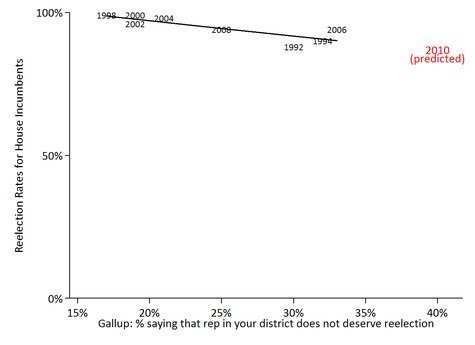
People! It's primary day today. Have you been able to get from place to place this afternoon without stepping in a sticky puddle of anti-incumbent rage?
I'm sure you haven't. See this afternoon, incumbent Senator Blanche Lincoln (D-Ark.) could very well lose her primary election. And while it may look for all the world that voters have turned on her for working to water down key pieces of the Democrat's larger legislative agenda for the past two years, you have to let the scales fall from your eyes and understand that she is an incumbent and, thus, a hunted woman.
This is a true fact, from Mike Allen: if Lincoln loses tonight, that will achieve a new and unprecedented level of primary casualties for sitting U.S. senators. The primaries have totally been a killing field! Already, the GOP has lost Senator Bob Bennett and the Democrats have lost Arlen Specter, and there's also... well, there's actually no one else! Lincoln would make three -- quite a purge!
Look, I know you are telling yourself that Bennett lost because of the vagaries of the Utah GOP convention, which made it easy for angry tea-pourers to rage against that time Bennett thought he'd be eminently reasonable and try to work with Ron Wyden on a health care reform alternative. And you've probably also convinced yourself that in the Pennsylvania Democratic primary, Pennsylvania Democrats, given the opportunity to vote for a Pennsylvania Democrat (incumbent Representative Joe Sestak) instead of a Pennsylvania Republican (opportunistic switch-hitter Arlen Specter), just did what came naturally to them.
But you really need to stop that foolish thinking! If you continue to adhere to the notion that elections are determined on the basis of boring fundamentals and idiosyncratic local issues, you will never ascend to the halls of Political Punditry. In order to achieve that level of repute, you must go in search of broad, overarching themes to the election that comfortably fit within the predetermined media narrative of the election season, even if they don't actually make a lick of sense.
The Washington Post's Dan Balz and Jon Cohen know the score, and they lay it all out for you in a piece entitled "Voters' support for members of Congress is at an all-time low, poll finds".
As voters head to the polls Tuesday for a crucial set of primary elections, a new Washington Post-ABC News poll finds antipathy toward their elected officials rising and anti-incumbent sentiment at an all-time high.
The national survey shows that 29 percent of Americans now say they are inclined to support their House representative in November, even lower than in 1994, when voters swept the Democrats out of power in the that chamber after 40 years in the majority.
See, something wicked this way comes, for the incumbents, right? I'm sure this is paced by that insurgent Tea Party that's so hot right now!
The poll also finds growing disapproval of the "tea party" movement, with half the population now expressing an unfavorable impression of the loosely aligned protest campaign that has shaken up politics this year.
Oh! Well, that sure looks bad for the nascent political movement that's driven the discussion of anti-incumbency all year. But one thing that cannot be denied is that 2010 is shaping up to be a great year for the GOP, the party out of power.
And at a time when Republicans anticipate significant gains in House and Senate elections, there is also fresh evidence of the challenges facing the GOP. Six in 10 poll respondents say they have a negative view of the policies put forward by the Republican minority in Congress, and about a third say they trust Republicans over Democrats to handle the nation's main problems.
Hmmm. Okay? I'm not sure where to take this argument then. Tell you what, we'll just approach the matter empirically, with statistical analysis. John Sides over at The Monkey Cage has got what I need:
Let's take a piece of data from Gallup: the percent who says that their U.S. representative does not deserve to be reelected. Gallup has these data from 1992-2010 (pdf). I'll plot the percentage from the poll closest to the election against the percentage of House incumbents who were reelected in 1992-2008.
There is a relationship between responses to this item and the reelection rate (and it's statistically significant, in fact). But the relationship is substantively very small. Perhaps the best evidence is the predicted reelection rate I calculated based on the 1992-2008 data, plugging in the most recent Gallup poll, in which a record 40% declared that their member did not deserve reelection. What is the predicted incumbent reelection rate?
87%.
Wow. Make way for the bloodbath!
[Would you like to follow me on Twitter? Because why not? Also, please send tips to tv@huffingtonpost.com -- learn more about our media monitoring project here.]

